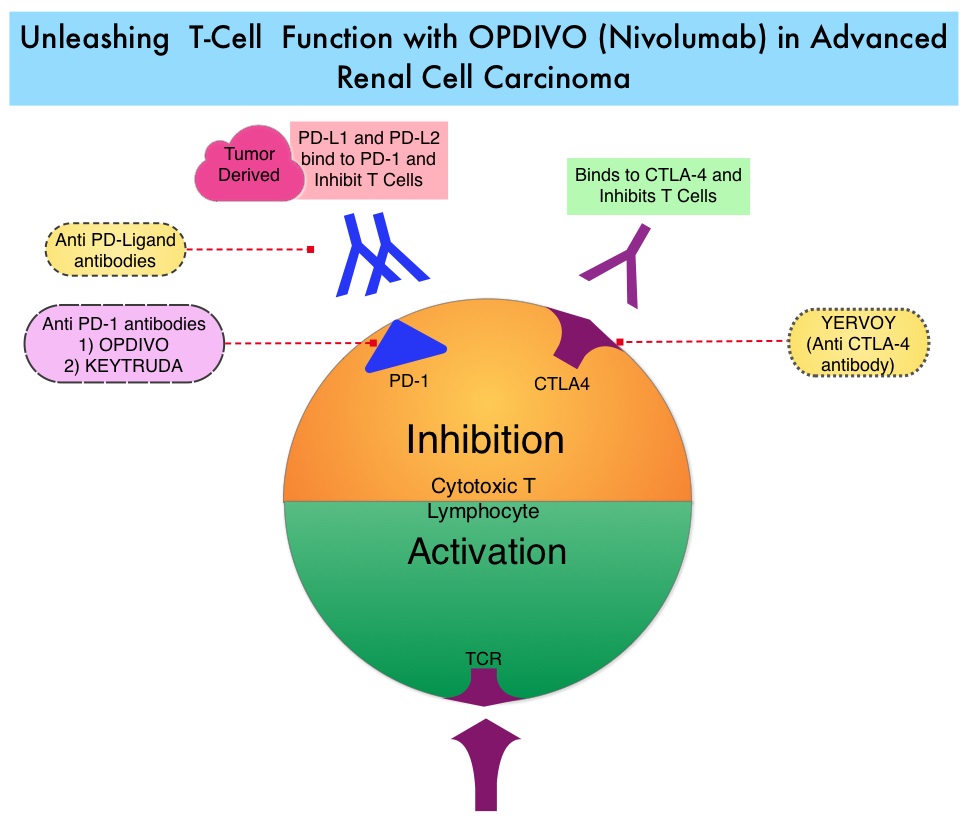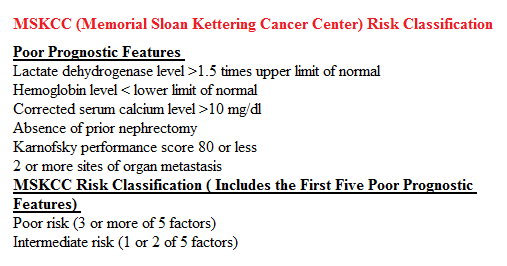SUMMARY: The American Cancer Society estimates that about 62,700 new cases of kidney cancer will be diagnosed in the United States in 2016 and over 14,000 patients will die from this disease. The understanding of the Immune checkpoints has lead to the development of novel immunotherapies. Immune checkpoints or gate keepers are cell surface inhibitory proteins/receptors that are expressed on activated T cells. They harness the immune system and prevent uncontrolled immune reactions. Survival of cancer cells may be related to their ability to escape immune surveillance, by inhibiting T lymphocyte activation. With the recognition of Immune checkpoint proteins and their role in suppressing antitumor immunity, antibodies have been developed that target the membrane bound inhibitory Immune checkpoint proteins/receptors such as PD-1(Programmed cell Death-1), etc. Following inhibition of PD-1 by specific antibodies, T cells are unleashed, resulting in T cell proliferation and activation with subsequent therapeutic responses. OPDIVO® (Nivolumab) is a fully human, immunoglobulin G4 monoclonal antibody that binds to the PD-1 receptor and blocks its interaction with PD-L1 and PD-L2, thereby undoing PD-1 pathway-mediated inhibition of the immune response and unleashing the T cells.
OPDIVO® was approved by the FDA in November 2015, for the treatment of advanced Renal Cell Carcinoma in patients who have received prior anti-angiogenic therapy. This approval was based on a randomized, open-label, phase III study (CheckMate 025), in which previously treated patients with advanced clear cell RCC, were randomly assigned to receive either OPDIVO® or AFINITOR® (N Engl J Med 2015; 373:1803-1813). It was noted that the median Overall Survival (OS) in the OPDIVO® group was 25 months and 19.6 months in the AFINITOR® group, and this meant a 27% reduction in the risk of death with OPDIVO® (HR=0.73; P=0.002). This survival benefit was seen with a minimum follow up of 14 months.
The authors in this publication reported the long term OS results from phase I and II OPDIVO® studies, leading to CheckMate 025 phase III study. In the phase I open-label study, 34 patients with advanced Renal Cell Carcinoma, with ECOG Performance Status of 2 or less and who had prior systemic treatment with 1-5 regimens, received OPDIVO® at a dose of 1 or 10 mg/kg every 2 weeks (J Clin Oncol 2015;33:2013-2020). At a minimum follow up of 50.5 months, the Objective Response Rate (ORR) was 29% and the median Duration of Response was 12.9 months. The 3 and 5 year OS rates were 41% and 34% respectively. In the phase II study, 167 patients with advanced Renal Cell Carcinoma with KPS of 70% or more and who had prior treatment with 1-3 regimens in the metastatic setting, received OPDIVO® at a dose of 0.3, 2, or 10 mg/kg every 3 weeks (J Clin Oncol 2015;33:1430–37). At a minimum follow up of 38 months, ORR was 21% and the median Duration of Response was 22 months. The 3 year OS rate was 35% and 4 year OS rate was 29%. Long-term survival was observed in MSKCC good, intermediate and poor-risk patients, as well as in patients with excellent or reduced Karnofsky Performance Status.
In the phase II study, 167 patients with advanced Renal Cell Carcinoma with KPS of 70% or more and who had prior treatment with 1-3 regimens in the metastatic setting, received OPDIVO® at a dose of 0.3, 2, or 10 mg/kg every 3 weeks (J Clin Oncol 2015;33:1430–37). At a minimum follow up of 38 months, ORR was 21% and the median Duration of Response was 22 months. The 3 year OS rate was 35% and 4 year OS rate was 29%. Long-term survival was observed in MSKCC good, intermediate and poor-risk patients, as well as in patients with excellent or reduced Karnofsky Performance Status.
The authors concluded that with this longest follow up data reported to date with any anti-PD-1/PD-L1 agent in advanced Renal Cell Carcinoma, about 33% of patients treated with OPDIVO® are alive at 5 years in the phase I study and at 3 years in the phase II study. Potential predictors of long term survival with OPDIVO® are being explored, in this previously treated patient population. Long-term overall survival (OS) with nivolumab in previously treated patients with advanced renal cell carcinoma (aRCC) from phase I and II studies. McDermott DF, Motzer RJ, Atkins MB, et al. J Clin Oncol 34, 2016 (suppl; abstr 4507)

